Home | Category: Muslim Food, Sex and Drugs / Arab Food and Drink
MUSLIM FOOD RESTRICTIONS
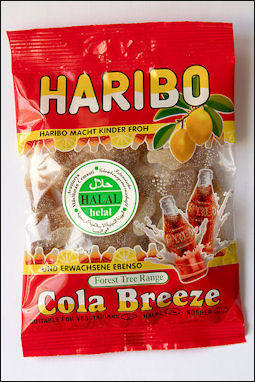
Halal Haribo Cola Breeze Muslims follow strict dietary practices. Pork, alcohol and meat from any animal with fangs forbidden. Animals that are eaten have to be ritually slaughtered in a specific way by a Muslim. The Moorish, idol a beautiful black, white and yellow striped angelfish that eats sponges. It was once considered sacred to some Muslims.
The dietary prohibition against pork comes from the Qur’an (5:3), which states: Forbidden to you are carrion, blood, and swine; what is slaughtered in the name of any other than Allah; what is killed by strangling, beating, a fall, or by being gored to death; what is partly eaten by a predator unless you slaughter it; and what is sacrificed on altars. You are also forbidden to draw lots for decisions.1 This is all evil. Today the disbelievers have given up all hope of undermining your faith. So do not fear them; fear Me! Today I have perfected your faith for you, completed My favour upon you, and chosen Islam as your way. But whoever is compelled by extreme hunger—not intending to sin—then surely Allah is All-Forgiving, Most Merciful..
The widespread use of pork products and by-products by U.S. food manufacturers creates difficulties for American Muslims. Lard, commonly used in the United States as shortening, is sometimes an ingredient in cookies, for example, and potato chips may be fried in it. [Source: John L. Esposito “Worldmark Encyclopedia of Religious Practices”, 2000s, Encyclopedia.com]
Muslims are not allowed to sell, buy or consume of alcohol, although in some cases it is permitted for medicinal purposes. This prohibition is based upon the Qur’an (5:90–91), which specifically forbids the consumption of date wine. Most Islamic jurists broaden this to include all mind-altering substance,, including alcohol and narcotics. Some mosques and Islamic centers provide lists of specific products known to contain either pork or alcohol, so that they can be avoided. Among the items listed is mustard, which sometimes is made with white wine.
Archaeology magazine reported: According to historical sources, people have long eaten Arabian spiny-tailed lizards. According to tradition, Muhammad did not eat them himself, but did not condemn the practice. At the site of al-Yamâma, archaeologists uncovered remains of lizards among those of other food animals, and at least one bone has a cut mark. The lizard bones appear in early layers (4th to 7th century, before and just after the establishment of Islam) and continue to the 18th century. The reptiles remain a source of protein and fat in some parts of the harsh desert today. [Source: Samir S. Patel, Archaeology magazine, July-August 2014]
Websites and Resources: Islam IslamOnline islamonline.net ; Institute for Social Policy and Understanding ispu.org; Islam.com islam.com ; Islamic City islamicity.com ; BBC article bbc.co.uk/religion/religions/islam ; University of Southern California Compendium of Muslim Texts web.archive.org ; Encyclopædia Britannica article on Islam britannica.com ; Islam at Project Gutenberg gutenberg.org ; Muslims: PBS Frontline documentary pbs.org frontline
RECOMMENDED BOOKS:
“My Halal Kitchen: Global Recipes, Cooking Tips, and Lifestyle Inspiration” by Yvonne Maffei Amazon.com ;
“A Comprehensive List of Halal Food Products in US Supermarkets” Amazon.com ;
“The Lawful and the Prohibited in Islam (Al-Halal Wal Haram Fil Islam) by Yusuf Al-Qaradawi Amazon.com ;
“The Sacred Cow and the Abominable Pig: Riddles of Food and Culture” by Marvin Harris Amazon.com ;
“Desified: Delicious Recipes for Ramadan, Eid & Every Day” by Zaynah Din Amazon.com ;
“Ramadan Fasting Recipes for Muslims” by Imam Zakariya Jameel Amazon.com ;
“Islam Explained: A Short Introduction to History, Teachings, and Culture” by Ahmad Rashid Salim Amazon.com ;
“No God but God” by Reza Aslan Amazon.com ;
“Welcome to Islam: A Step-by-Step Guide for New Muslims” by Mustafa Umar Amazon.com
Halal Products
“Halal” (“untainted”) is a term once used to describe meat slaughtered and prepared according to Muslim requirements but is now used to describe a whole range of products that meet Muslim standards. Halal can refer to meat slaughtered in a religious manner or permissible activities or things for Muslims. Haram refers to prohibited activities or things for Muslims.
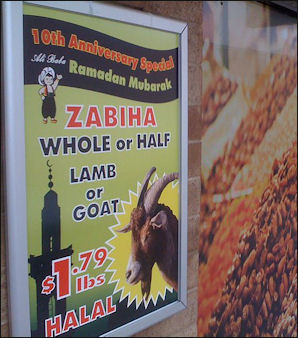
Halal meat store Ruqaiyyah Waris Maqsood told the BBC: “The rules are those of haram (banned) and halal (allowed). All vegetable, fruit, grain and seafood is halal. Meat is halal providing it has been killed in the kindest possible way by a sharp instrument that pierces and kills swiftly (sharp knife, bullet, sword), and the appropriate prayers are said at its death (or at the time of eating if one is not certain). [Source: Ruqaiyyah Waris Maqsood, BBC, September 3, 2009 |::|]
“Muslims may not eat any food that has been sacrificed to idols (e.g. Hindu meat), but kosher is fine. They may not eat any pork product or flesh with blood undrained from it; the most extreme Muslims will not touch anything that has animal fat included - even a biscuit - in case it is pork lard or gelatine from an animal not killed in the halal manner. If Muslims eat haram food without realising it is haram (i.e. some butchers 'fake' their halal tickets), they are not held to blame, but judged by their intention. In cases of necessity, Muslims may eat anything available, even pork, rather than suffer hardship. Alcohol is haram. |::|
Halal criteria can be applied to a host of products. Halal cosmetics offered by Saaf contain no animal fats or alcohol. Among the buyers are non–Muslim who demand pure ingredients and are concerned about animals rights. Halal vitamins sold by Canada’s Duchesenay are free of gelatin that are often made of animal derivatives. Malaysia-based Ganulab produces synthetic bone grafts with animal bone.
Halal Food Market
The annual halal food market is estimated to be around $2 trillion, up from $632 billion in the 2000s, , according to the Kuala-Lumpur-based Halal report, Halal food holds a 16 percent share of the global food industry. Muslim-owned companies such as Dubai’s Al Islami sells everything from chicken burgers to frozen spinach.
Dominos’ pizza offers halal pepperoni from Malaysia. Both Kentucky Fried Chick and Subway have halal-only branches in Britain. Carefore hypermarkets have elaborate system to alert customers what is halal and what isn’t. In Western countries, before halal foods became widely available, many relied on Jewish kosher food to meet their dietary restrictions.
Some Muslim-owned deli and groceries in New York City sell beer and wine much to the chagrin of their owners, who are well aware of the Muslim prohibitions of alcohol, but feel they have no choice to sell them if then want to warn a reasonable income. Asked how he felt selling “haram (forbidden) items, the Muslim Bangladeshi owner of one such store said, “Selling haram is the same as earing haram. I feel guilty, totally guilty. I want to sell the business and go home and not sell haram. Every day I’m thinking I should do that.” An Egyptian Muslim at another store said he hired a non-Muslim to handle the beer, “Beer and cigarettes and deli sandwiches are the most important things in the deli-grocery business.”
Halal Slaughtering Methods
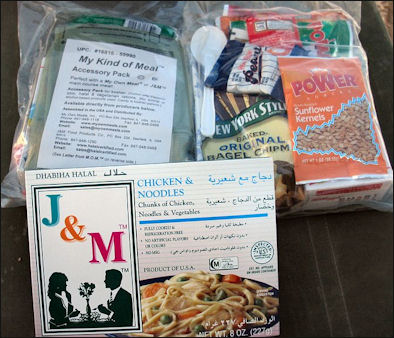
Halal Detainee Food Muslims believe that livestock should be slaughtered in accordance with Islamic Shariah law. “ Halal” (“untainted”) meat eaten by Muslims is essentially the same as kosher meat, except that animal is slaughtered while facing Mecca while the butcher says Allah's name. Islam requires the animal is killed with single slash to the throat while alive. It is intended as a way for animals to die swiftly and minimize their pain. Halal products should not be contaminated with pork or alcohol.
The Qur’an states: "Forbidden to you (as food) are carrion and blood and swine-flesh, and that which has been dedicated to any other God, and the strangled, and the dead through beating, and the dead through falling from a height, and that which has been killed by (the goring of) horns, and that which has been devoured except that which you make lawful (by killing it while it is still alive), and that which has been immolated to idols."
Under halal, an animal is hung upside down in a slaughterhouse and a halal, butcher, with his head covered, slits the animal’s throat with a knife while saying the prayer “”Bismallah Alluha akbar” “(“Thank you God is Great”). The blood is drained as the animal bleeds to death. Hoisting up the animal speeds up the bleeding process. Kosher-killed animals are also hung and have their blood drained. Many butchers in India and other South Asia countries are Muslims because Hindu and Buddhists consider butchering as dirty, distasteful and cosmically and religiously uncool.
According to the BBC: “Muslims are only allowed to eat meat that has been killed according to Sharia law. This method of killing is often attacked by animal rights activists as barbaric blood-thirsty ritual slaughter. Muslims disagree. They say that Islamic law on killing animals is designed to reduce the pain and distress that the animal suffers. [Source: BBC, August 13, 2009 |::|]
“Rules for Islamic slaughter: 1) the slaughterer must be a sane adult Muslim; 2) the slaughterer must say the name of God before making the cut; 3) The name of God is said in order to emphasise the sanctity of life and that the animal is being killed for food with God's consent; 4) the animal must be killed by cutting the throat with the single continuous back and forth motion of a sharp knife; 5) the cut must sever at least three of the trachea, oesophagus, and the two blood vessels on either side of the throat; 6) the spinal cord must not be cut; 7) animals must be well treated before being killed; 8) animals must not see other animals being killed; 9) the knife must not be sharpened in the animal's presence; 10) the knife blade must be free of blemishes that might tear the wound; 11) the animal must not be in an uncomfortable position; 12) the animal must be allowed to bleed out. |::|
Are Halal Slaughtering Methods Cruel?
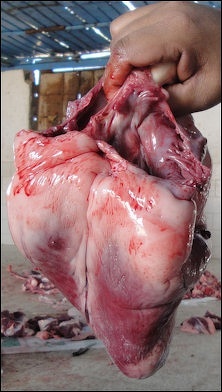
camel heart
In Britain many animals killed by the halal method are given a preliminary nonlethal stun to control them and reduce the processing time. One butcher in Manchester told the Independent: “Non-stun slaughter is a much lengthier process. Animals have to be put on cranes, which is time consuming. It can take a week to kill 500 lambs. But if stunning is adjusted to a lower level—such that the animal would recover fully if it were not killed immediately afterwards—then that is halal, so long a the man who slaughters is a devote Muslim who says each time the prayer.” Many Muslims object to the practice of stunning. They are also outraged by Muslim chicken abattoirs than kill 7,000 birds an hour with whirling blades and taped prayers.
According to the BBC: ““Some experts say that the animal killed in this way does not suffer if the cut is made quickly and cleanly enough, because it loses consciousness before the brain can perceive any pain. Other experts disagree and say that the animal remains conscious long enough to feel severe pain. [Source: BBC, August 13, 2009 |::|]
“Secular animal slaughter involves pre-stunning animals so that they are unconscious before they are killed. Until recently Muslim law has not permitted pre-stunning. Muslims feared that pre-stunning might reduce the amount of blood that could drain from the carcase and also because they thought that the animal was sometimes killed by the stunning. But recently (2004) Masood Khawaja, president of the Halal Food Authority, stated that it was not against halal practice to "immobilise" animals, provided they were not actually killed before their throats are cut. |::|
“Halal meat imported to the UK from New Zealand is stunned before slaughter. Masood Khawaja said that this was acceptable to Muslims, provided the religious rites were observed. He said: “It is acceptable as long as the animal is not dead prior to slaughter, all flowing blood has been drained, and a Muslim has done the ritual slaughter.” [Source: Masood Khawaja, President, Halal Food Authority, 2004]
Criticism of Halal and Kosher Slaughterers
In 2003, animal rights group called for a ban on kosher and halal slaughter, citing them as cruel to the animals that are slaughtered. One animal rights activist told the Independent: “Scientific evidence shows that animals that have their throats cut while they are fully conscious can suffer terribly over relatively lengthy periods as they bleed to death.” According to a report on the practice: “After the cut has been made, the animal must remain restrained until it is bled out before being released, shackled and hoisted.”
Martin Potter, the leader of a British animal rights group, argued that animals should be stunned either before they are killed or immediately afterwards. He wrote in The Independent: “Modern stunning instruments in the hands of highly skilled slaughters can render an animal unconscious immediately. We therefore, have the ability to give this animals a quick and painless death. Slaughter by Jewish and Muslim methods involves cutting the throat with a very sharp knife without any form of prior stunning...This method can result in cattle taking as long as two minutes to become insensible...The cut across the neck leads to very significant pain and distress before the insensibility supervenes.”
Muslim and Jewish groups have united to fight the ban on the basis of freedom of religion. They make the argument that stunning can be as cruel or more cruel then cutting; that the proposed use of stunning defies their religious laws by leading to the retention of blood in the meat; and say the Nazi evoked similar arguments against kosher slaughter in the 1930s.
A halal butcher in London told the Independent: “I believe it is our right as Muslims to eat halal meat, which is an essential part of Islam. I have taken part in the slaughter of poultry in the past so I know it is a quick and efficient method, not cruel at all.” A member of the Muslim Council of Britain said, “Scientific tests have shown that when an animal is stunned, small blood vessels repture, leaving meat tainted with blood which is full of germs, bacteria and waste material.”
Tapping a Growing Halal Market
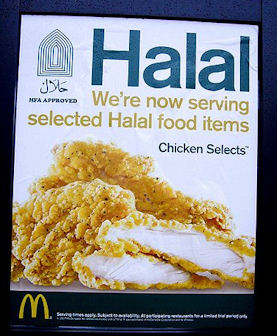
Halal McDonalds In 2011, Wharton School of Business reported: “Investors with an eye on the Islamic world have witnessed parallel growth in two industries serving Muslims worldwide: halal products and Islamic finance. Halal — Arabic for “allowed” — signifies a product created in adherence with Islamic guidelines. Halal products are spread across several industries, including foodstuffs, cosmetics, fashion and health care. Islamic finance is banking that follows Muslim precepts, such as the banning of interest on savings and loans. [Source: Wharton, September 9, 2011 -]
“Intended to serve more than one billion Muslims across the world, both markets boast compelling figures. Global Islamic finance is now considered to be a nearly $1 trillion industry, while as of last year, the worldwide halal market was worth an estimated $630 billion. That includes Europe and North America, which account for 12% of the global halal market. -
“The growth of these industries has spurred some investors to develop new financial products that combine bits of both, including halal food indices and equity funds. In April, the SAMI Halal Food Index was launched, while in August, Malaysia-based OSK-UOB Islamic Fund Management started the Global Food Islamic Equity Fund. -
“There are already numerous Islamic funds and indices for Muslim investors, such as the Dow Jones Islamic Index, that shun companies engaging in anything un-Islamic — such as the production of alcohol — and carry a low level of debt and interest earnings. But Rushdi Siddiqui, SAMI Halal Food Index chairman and global head of Islamic finance for Thomson Reuters, noted in a statement that the SAMI index specifically targets investors wanting a piece of the halal market’s growth. “Why not create a halal food index that captures those companies, and have it available for all investors?” Siddiqui asked. “A Halal food index would build bridges to Muslim investors [and] generate Sukuk (Islamic bond) issuance for financing halal food companies, and the money [would stay] in Muslim countries for the development of the halal food industry.” -
“According to Md Noor A. Rahman, chief executive officer of OSK-UOB, growing pressure on foodstuffs availability has provided investors an opportunity to profit. “An increasing global demand for food, coupled with the growth of the halal food industry, [has] resulted in a niche market,” he said in a statement. -
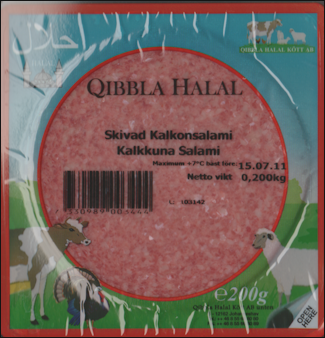
Qibbla Halal sliced turkey salami “But would-be investors in halal should consider some pitfalls, detailed in a May report on the global halal market by the Canadian government’s agricultural department. Overseas companies trying to break into the Western halal market have stumbled over export and logistics costs, and have lost savvy customers to bad packaging and labeling, the report notes. The halal market is also fragmented because of different Muslim sects, income disparities, ethnicity and several other factors, requiring a local approach rather than a one-fits-all scheme. Additionally, “consumers may lose confidence in the product’s halal status,” the report warns. “It is important to ensure that halal certification comes from a reputable body. Halal status should be preserved, not misused. If consumers lose confidence in the product’s halal status, they will not continue to buy it.” -
“There is also the reality that halal products can sometimes cause public relations issues for retailers in the West, because a Muslim association with a product or service could alienate some customers. In August, Whole Foods was forced to do an about-face and apologize after the company sent an email to its stores instructing employees not to mention Ramadan, the Muslim holy month, in conjunction with the promotion of a halal food line on its shelves. -
Demand for Halal Food Grows
In 2014, Associated Press reported: “The global industry for Halal food and lifestyle products — ones that meet Islamic law standards of manufacture — is estimated to be worth hundreds of billions of dollars and is multiplying as Muslim populations grow... The world's Muslim population is estimated at around 1.6 billion, and the majority is believed to adhere to or prefer to adhere to Halal products when possible. Many Muslims in the West buy Jewish kosher products when their Halal counterparts are not available. [Source: Associated Press, March 29, 2014 /=/]
“Datamonitor, a company that provides market and data analysis, says halal food already accounts for about a fifth of world food trade, and the Muslim market is growing substantially. According to a Global Futures and Foresights Study, 70 percent of the world's population increase from 7 billion today to 9 billion people by 2050 will be born in Muslim countries. /=/

Emirates Airlines Halal economy class meal
“Already in Muslim-majority countries, outlets like McDonald's, Subway and Papa John's pizza serve Halal to their customers. In the U.S., the family-run Midamar Corporation, based out of Cedar Rapids, Iowa, has been tapping into the Halal market since 1974. Midamar exports American beef and chicken to around 35 countries. Jalel Aossey said the company's Halal certification comes from an organization his father started called the Islamic Services of America, which he says was the first of its kind in the U.S. /=/
“Today there are around 30 Halal certification bodies in the U.S. and several mainstream supermarkets that carry Halal food items.“Even in markets where Muslims are not the majority, there are billions of dollars to be made in the Halal industry. The Islamic Food and Nutrition Council of America, a not-for-profit Halal certification organization, said the domestic U.S. Halal market is estimated at $20 billion.” /=/
Halal Food Industry Expands to Meet Growing Demand
Malaysia is the global leader in developing the Halal industry and maintaining the highest standards. According to Associated Press: “Malaysia exported $9.8 billion worth of Halal products in 2013, the Oxford Business Group said. That makes it one of the largest suppliers in the Organization of Islamic Cooperation, an international group with 57 members. [Source: Associated Press, March 29, 2014 /=/]
“Producers outside the Muslim world, from Brazil to the U.S. and Australia, are eager to tap into the market.... U.S. manufacturers, such as Kelloggs and Hershey, plan to build Halal-compliant plants in Malaysia. The Oxford Business Group says Indonesia, with the world's largest Muslim population, plans to establish a center for the Halal industry in 2015. In Thailand, more than a quarter of food factories are already making Halal products. But it is in the Gulf, where countries almost entirely rely on food imports, where the Halal industry seems to have the biggest potential for growth in the coming years. /=/
“Brazil is the world's second top exporter of meat and poultry to Muslim-majority countries after the U.S. The Brazil Food Company, which is among the world's largest food companies, plans to open its first manufacturing site in the Middle East in UAE's capital, Abu Dhabi, in June. The factory will process poultry from Brazil for repackaging and shipping to other countries. /=/ "Having the factory will allow us to be closer to the market and will allow us go to different markets that today we cannot export to from Brazil," BRF Quality Assurance Supervisor Tiago Brilhante said. The company already exports 70,000 tons of chicken to the Middle East each month, making the region its biggest export market. /=/
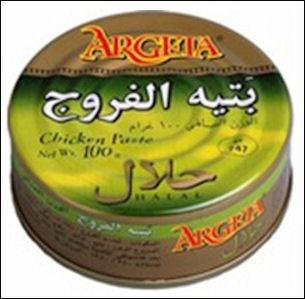
“The United Arab Emirates is positioning itself to be their gateway, part of its push to become a global center of Islamic business and finance. UAE officials announced that the city of Dubai has dedicated around 6.7 million square feet of land in Dubai Industrial City for a "Halal Cluster" for manufacturing and logistics companies that deal in Halal food, cosmetics and personal care items. Dubai Industrial City CEO Abdullah Belhoul said the idea to create a zone just for Halal manufacturers was driven by the increased demand locally and internationally for such products. "This industry itself, we know it is growing," Belhoul told The Associated Press. He said the industry is expected to double in terms of value within five years. "So we think there is a lot of opportunity... and we need to capitalize on this." /=/
“Halal Control, which concentrates on products made in Europe, does not certify meat and poultry, but almost everything else from dairy products to food ingredients. Tatari said Muslims around the world may think they are eating Halal-certified food, but that often raw materials may include alcohol or pork gelatin in candies and soups, or may have been cross-contaminated during production. "It is a process and this will take maybe now five to 10 years (until) we can more safely eat Halal," he said. /=/
“Mark Napier, director of the Gulfood trade show that brings together more than 4,500 food and beverage vendors from around the world to the Dubai World Trade Center annually, said producers of halal products want to serve markets where their supply is not keeping up with demand. “"Food business is big business," Napier said. "Producers are increasingly aware of the need for Halal standards and certification and bringing that to the fore of their export promotions." /=/
Debate over What is Halal and What Isn’t
There is some debate over what is acceptable according to Sharia laws on Halal. According to Associated Press, “As with most issues in religion, opinions vary greatly over what is permissible and what is not. Despite attempts by international Islamic bodies, such as the World Halal Food Council, to achieve worldwide guidelines, there are no global standards for Halal certifications. [Source: Associated Press, March 29, 2014 /=/]
“Stricter interpreters of Shariah say chicken must be slaughtered by hand to be considered Halal. Others say it is acceptable if the chicken is slaughtered by machine, as is the case in much of the fast-paced food industry around the world. To accommodate various Muslim consumers, several companies even specify on their packaging how the chicken was slaughtered. /=/
“Belhoul said that if Halal products are manufactured in the UAE, they will need to be certified Halal by the government body that oversees this. But, as with most countries, if the Halal products, such as livestock or raw material, are being imported from abroad for processing in the UAE, then the stamp of approval comes from Islamic organizations in the exporting country. /=/
“This is where organizations such as Halal Control in Germany have an important role to play, said General Manager Mahmoud Tatari. He said that when the company started 14 years ago in Europe, there was little awareness or demand for Halal products. Today, Halal Control has 12 Islamic scholars who offer guidance on certifications to international companies such as Nestle and Unilever who want to do business in the Muslim world.” /=/
Muslims and Pork
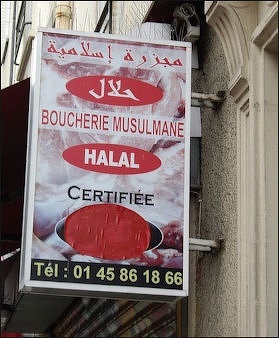
Halal butcher in Paris
Muslims and Jews (and some Christians) are forbidden from eating pork. The Jewish and Christian God spoke out twice against eating pork in the Old Testament (in Genesis and again in Leviticus), denouncing the pig as an unclean animal that "pollutes if it is tasted or touched." Allah delivered essentially the same message to Muhammad in the 7th century, but revoked the Biblical taboo on eating camel flesh.
Pork is the only food that the Qur’an specifically forbids Muslims to eat. The Qur’an states: "Forbidden to you (as food) are carrion and blood and swine-flesh.” By contrast Jews are forbidden by the Bible from the eating of birds, four-footed beats with "paws" (wildcats, lions, foxes, wolves, dogs and cats), water dwellers with scales or fins (eels, shellfish, whales, dolphins, sturgeons, lampreys, and catfish), "all winged insects that go upon all fours" (with the exception of locusts, crickets and grasshoppers "which leap upon the earth"), "camel, rock badger and hare" and animals that "chew the cud" but are not "cloven footed" (pigs).
Muslims are supposed to watch out for alcohol and gelatin made from pork fat in their food with the same vigilance of vegetarians who scan packaging labels for signs of lard. Vanilla, wine vinegar, cider and perfume are supposed to be avoided because they all contain alcohol. Gelatine made from pork fat is found in marshmallows, cream pies, cake fillings, candies and commercial yoghurt. Some devout Muslims scrap the icing off of cupcakes and cake lest the be contaminated with lard.
Eating pork is for the most part forbidden but if you are crossing the desert and no other food is available it is alright to eat it.
Pigs
Pigs are believed to have been domesticated from boars 10,000 years ago in Turkey, a Muslim country that ironically frowns upon pork eating today. At a 10,000-year-old Turkish archeological site known as Hallan Cemi, scientists looking for evidence of early agriculture stumbled across of large cache of pig bones instead. The archaeologists reasoned the bones came from domesticated pigs, not wild ones, because most of the bones belonged to males over a year old. The females, they believe, were saved so they could produce more pigs.
In the fifth and fourth millennia B.C. in Mesopotamia, 30 percent of bones excavated in Tell Asmar (2800-2700 BC) belonged to pigs. Pork was eaten in Ur in pre-Dynastic times. After 2400 B.C. it had become taboo. In Egypt, pigs were eaten, but there was prejudice against pork associated with Seti, the God of Evil.
Pigs were originally tuber-eating forest and swamp creatures. They had difficulty living in the deserts of the Middle East because they don't sweat and therefore can't cool themselves. When pigs were first domesticated there were vast forest areas in what is now Turkey and the Middle East. There was enough water and shade to support small number of pigs, but as population in the Middle East grew, deforestation degraded the environments best suited for the animals.
In an attempt to explain why pork was forbidden, the 12th century Jewish-Muslim physician Maimonides wrote pig flesh "has a bad and damaging effect upon the body." But he didn't offer any specifics. In the 19th century, the discovery that trichinosis was caused from eating undercooked pork was offered as evidence to back up Maimonides assertion.
Why Is Pork Forbidden?
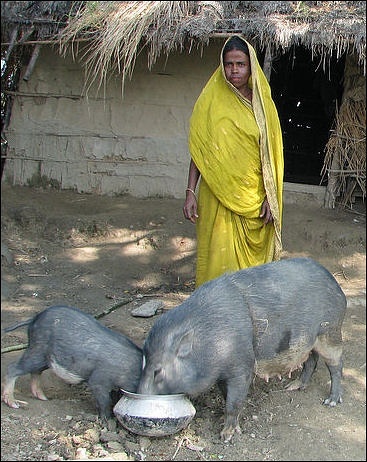
pigs in Muslim Bangladesh
Pigs are by far the most efficient protein and fat producing animal domesticated by man. They converts grains and tubers into high-grade fats and proteins more effectively than other animals. Almost 25 percent of the food by weight fed to pig is converted to meat, compared to 14 percent for chicken, 13 percent for sheep and 6.5 percent for cattle. In addition females produce litters that average eight piglets after a four gestation period. The piglets in turn can be fattened up to a 400 pound hog in six months.
Why is pork forbidden then? Scholars have generally argued that pork was forbidden because pigs have traditionally been regarded as dirty animals because they eat excrement and wallow in mud produced from their own urine and are associated with trichinosis, a disease is caused by the quarter-inch-long trichina worm, a kind of roundworm which digs into the muscles and produces cysts that can be fatal.
Columbia anthropologist Marvin Harris has said something else must be involved. "Hungry cows will eat human excrement with gusto," he wrote. "Dogs and chickens do the same thing without getting anyone very upset...The pig is a vector of human disease, but so are other domestic animals freely consumed by Muslims and Jews. For example, undercooked beef is a source of parasites, notably tapeworms, which can reach a length of sixteen to twenty feet within a man's intestines." Cattle, sheep and goats are sources of anthrax, brucellosis and other human diseases.
Harris offers a natural and environmental explanation for the prohibition of pork. Pigs, he argued, were originally primarily tubor-eating forest and swamp creatures that had difficulty living in the deserts of the Middle East because they don't sweat and therefore can't cool themselves. Their habit of rolling around in urine and excrement is a way to keep cool. Pigs also have difficulty living in arid regions because they can not subsist off of grass alone, they are difficult to herd over long distances, and they don't produce milk.
When pigs were first domesticated there were vast forest areas in what is now Turkey and the Middle East. Ten thousand years ago, Harris argues, there was enough water and shade to support small number of pigs, but as the population in the Middle East grew, deforestation degraded the environments best suited for pigs. As a result pigs became a luxury that most people couldn't afford, their dirty behavior increased in the hot conditions and the taboo against the animal developed.
Unlike other domesticated animals, pigs are prized as source of meat and little else. They can't be ridden, milked or used to pull or carry things.
Muslims and Alcoholic Drinks
Ancient Palestine Wine Press Islam prohibits the consumption of alcohol. A lot of Muslims drink but they are either very secretive about it and just do it occasionally. In Muslim countries that have alcohol prohibitions alcoholic drinks are generally available at hotels with Western customers. Alcoholic drinks have traditionally been supplied by the Christian community.
Even though most Arabs are Muslims who don't drink, they gave us the word alcohol. “ Al kohl” is Arabic for "a powder for painting the eyelids." Kohl had been used since ancient times as an eyeliner. Later it came to mean exotic substance. Also, ironically, Arabs developed the technology of distillation — a way of making the alcohol content in beverages higher — and introduced it to Europe in Middle Ages.
The Qur’an explicitly prohibits wine made from grape juice but does not mention other fermented drinks. But by saying wine is an analogy for all alcoholic drinks the prohibition on wine can be extended to all alcoholic drinks. Muhammad said: "Do not drink wine; for it is the root of all evil; abstain from vice; and when pestilence shall pervade mankind, and you shall be amongst them; and cherish your children." He also said: "he is not a good Muslim who committeth adultery or getteth drunk, who stealeth, or plunderth, or who embezzeleth; beware, beware."
Even in places where there is extreme poverty you don't see many alcoholics or drug addicts because the religions ban on alcohol and drugs. Muslims are supposed to avoid perfumes, foods and medicines made with alcohol. Women are supposed to be especially careful about entering a mosque wearing perfume.
Image Sources: Wikimedia Commons
Text Sources: Internet Islamic History Sourcebook: sourcebooks.fordham.edu ; Arab News, Jeddah; “Islam, a Short History” by Karen Armstrong; “A History of the Arab Peoples” by Albert Hourani (Faber and Faber, 1991); “World Religions” edited by Geoffrey Parrinder (Facts on File Publications, New York); “Encyclopedia of the World’s Religions” edited by R.C. Zaehner (Barnes & Noble Books, 1959); Metropolitan Museum of Art, Encyclopedia.com, National Geographic, BBC, New York Times, Washington Post, Los Angeles Times, Smithsonian magazine, The Guardian, Al Jazeera, The New Yorker, Time, Newsweek, Reuters, Associated Press, AFP, Library of Congress and various books and other publications.
Last updated April 2024

